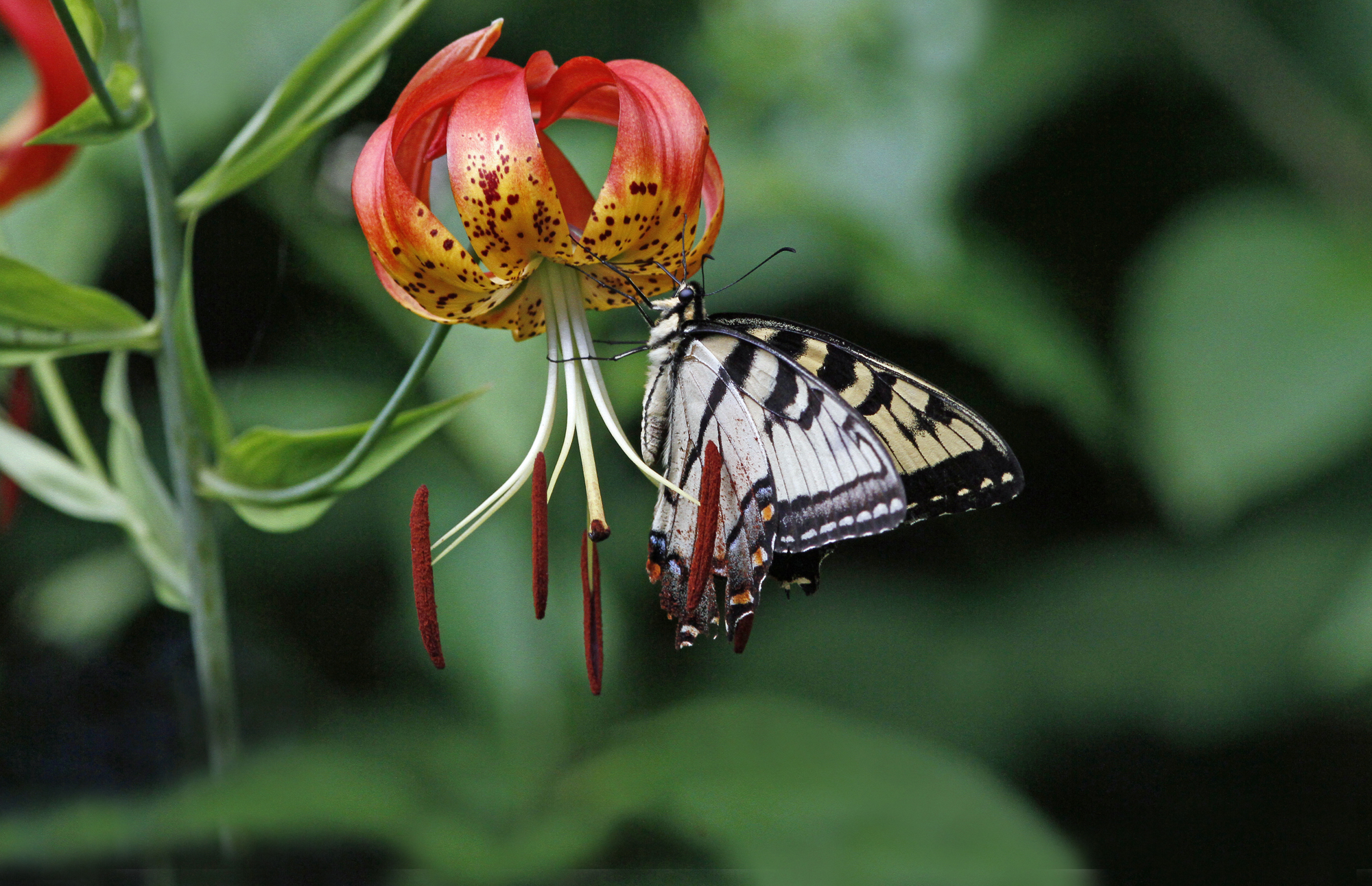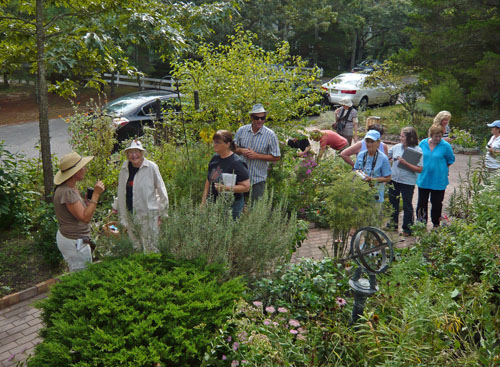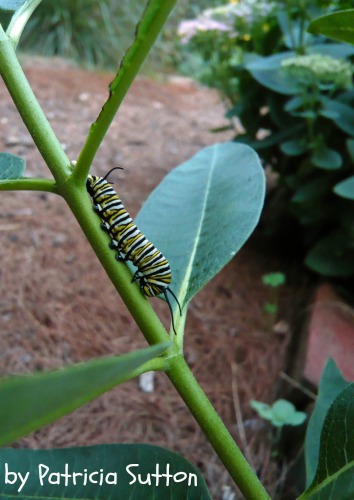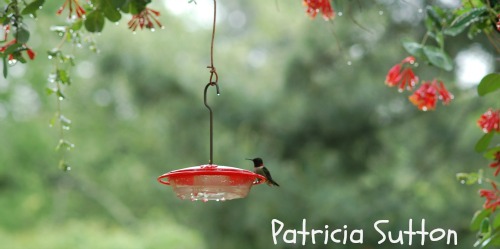
Hi Gardening Friends,
The “Tours of Private Monarch Gardens” are fast approaching. And well timed indeed.
All our gardens are swarming with Monarchs, a host of other butterflies, hummingbird moths, and hummingbirds (though by mid-September Ruby-throated Hummingbird numbers will lessen).
Since August 30th at least a dozen Monarchs have been in view at any one time in my own garden, lilting about, sailing from wildflower to wildflower, dashing after one another, and even a few have been paired up and mating and laying eggs. It’s a magic time of year indeed.
Migrating Monarchs from the North are now moving through with each cold front. And our local Monarchs, not yet ready to migrate, are mating and creating yet one more generation that will migrate south later this fall.
The “Old Fashioned” Sedum with the soft pink flowers began blooming this week & is carpeted with Monarchs, American Ladies, Common Buckeyes, hairstraks, Sachems (a type of skipper), and more! Tropical Milkweed is still in full bloom and, being an annual, will bloom right up until the frost — truly a show stopper! One of my patches of Tropical Milkweed had 6 nectaring Monarchs on it this morning. On closer inspection I spotted a number of Monarch caterpillars happily munching leaves below the nectaring adults.
Common Milkweed is looking a bit nasty right now, having bloomed back in July, but despite that its leaves are still attracting adult Monarchs looking to lay eggs. In fact right now all the other milkweeds in our Monarch Gardens (Tropical, Swamp, Butterflyweed, & Common Milkweed) are covered with Monarch eggs, caterpillars, hidden chrysalides, and adults continuing to lay new eggs daily.
We’re all having great fun monitoring our Milkweed patches and looking for these hidden treasures that will be part of the final fall generation of migrating Monarchs. By the time of the tours New England Aster, Seaside Goldenrod, and other fall blooming plants will be in full bloom and STUNNING! My Coral Honeysuckle is yet having another resurgence and in full bloom again, making lingering hummingbirds happy.
The Cape May Bird Observatory’s Monarch Monitoring Project has begun and this fall’s intern, Jenny Howard, is already tallying numbers day-by-day and tagging migrants. Learn of CMBO’s FREE Monarch Tagging Demos.
Details of the Nature Center of Cape May’s Semtember “Tours of Private Monarch Gardens” follows:
- Friday (September 10) we’ll tour “Mid-County Gardens” (North Cape May to Rio Grande)
- Saturday (September 11) we’ll tour “North Gardens” (Eldora & Dennisville & South Seaville south to Goshen & Reeds Beach)
- Sunday (September 12) we’ll tour “South Gardens” (Cape May, Cape May Point, and farmland south of Cape May Canal)
My own garden is on the “North Tour” on Saturday, but all the gardens are GEMS and stunning and offer great learning opportunities, plus lots of fun wildlife watching. The tours are a great way to get ideas for your own garden and to see first hand various garden designs, plant combinations, native plants that are lovely, nectar plants, caterpillar plants, great shrub ideas, garden accents and features like misters, dragonfly ponds, arbors, and of course LOTS of wildlife.
Imagine getting a glimpse into private backyard wildlife gardens, interacting with the artists who created them, having each and every garden and wildlife question answered, and enjoying it with a group of fellow wildlife gardeners. Please consider joining me for one or all of these tours.
Details about the tours (pricing, what to bring, where to meet) & how to sign up for these September Tours are at the end of this e-mail. Or call the Nature Center of Cape May TODAY to book your place(s) by calling: 609-898-8848 (be prepared to pay for your spot, preregistration is required to hold your place).
If some of you are keen to create a butterfly & hummingbird garden, be sure to download the article & plant list I wrote / created:
Plan to join me on one, two, or all 3 of the remaining 2010 “Tours of Private Wildlife Gardens” that I will be leading for NJ Audubon’s Nature Center of Cape May.







 Hi Gang,
Hi Gang, Sign up today and begin getting ready for the workshops. Draw a rough sketch of your yard, indicating structures (and hardscapes like driveways, decks, etc.), existing habitats (lawn, forest, lone trees, shrub islands, gardens, bird feeding station, brush pile, etc.), and mark NORTH, SOUTH, EAST, WEST on the sketch. Take time to note the sun’s path through your yard and where the sunniest areas are. Bring a wish list of the elements you want to add as well as the elements you need to work around.
Sign up today and begin getting ready for the workshops. Draw a rough sketch of your yard, indicating structures (and hardscapes like driveways, decks, etc.), existing habitats (lawn, forest, lone trees, shrub islands, gardens, bird feeding station, brush pile, etc.), and mark NORTH, SOUTH, EAST, WEST on the sketch. Take time to note the sun’s path through your yard and where the sunniest areas are. Bring a wish list of the elements you want to add as well as the elements you need to work around.